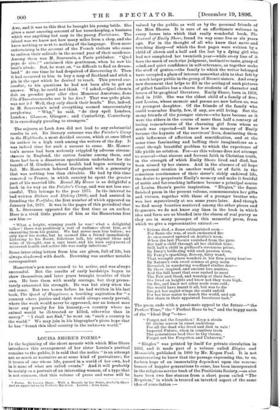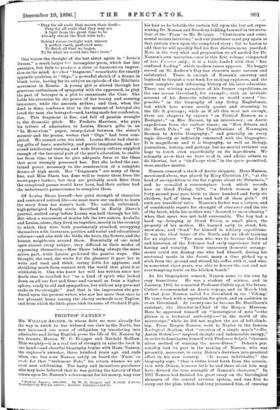LOUISA SHORE'S POEMS.*
IN the beginning of the short memoir with which Miss Shore introduces this arrangement of her sister Louisa's poetical remains to the public, it is said that the notice "is an attempt not so much at narrative as at some kind of portraiture ; for it treats of one whose life, passed in a world of her own, had in it none of what are called events." And it will probably be mainly as a portrait of an interesting woman, of a type that is not common, that this volume of prose and verse will be • Poems. By Loma Shore. With a Memoir by her Sider. Arabella Shore And an Appreciation by Fiederie Harrison. London : John Lane.
valued by the public, as well as by the personal friends of the Miss Shores. It is sure of an affectionate welcome in every house into which that really wonderful book, The Journal of Emily Shore, found its way some five or six years ago. For in the thought of all who know that naive and touching diary—of which the first pages were written by a child of eleven and a half and the last by a dying girl who had not completed her twentieth year—while every line of it bore the mark of such ripe judgment, instinctive taste, grasp of mind, and quiet confidence in self-utterance, as together make the stuff of genius,—the family to which the writer belonged have occupied a place of interest somewhat akin to that felt by a much larger public in the group of Brontë sisters. And every new document that helps to fill in the setting of such pictures of gifted families has a charm for students of character and lovers of biographical literature. Emily Shore, born in 1819, died in 1839. She was the eldest child of a family of five; and Louisa, whose memoir and poems are now before us, was its youngest daughter. Of the friends of the family who could remember Emily, few, if any, are still living. But the
many friends of the younger sisters—who have become as it were the elders in the course of more than half a century of
loving remembrance of the charming girl from whom so much was expected—all know how the memory of Emily became the keynote of the survivors' lives, dominating them with influences of affection and sanctification, and at the same time fascinating and baffling their imaginations as a cruel though beautiful problem to which the experience of life yields no solution. For—as this volume does not attempt to conceal—that sincere and fervent faith in Christian truth, in the strength of which Emily Shore lived and died, has
been missed by her sisters. And in the absence of all hope of personal reunion in another world, or of faith in the conscious continuance of their sister's richly enclOwed life, the desire to perpetuate Emily's memory and make it fruitful of noble and far-reaching influence became a principal source of Louisa Shore's poetic inspiration. "Elegies," the finest
finished poem in the present volume, commemorates her gifts and virtues, together with those of a younger brother who was lost mysteriously at sea some years later. And though we find many beauties scattered among the other pieces and fragments, we do not know any lines in the book in which idea and form are so blended into the charm of real poetry as they are in many passages of this memorial poem, from which we give a representative extract :—
Eriona died, a flame extinguished soon—
For flame she was, of such enchanted fire As once soared upward on Arabia's noon, When the last Phcenix vanished from the pyre. But half a child through all her childish time, Still half a child in girlhood's strenuous prime, By Duty's bride-ring with such passion worn, By Fancy's sparkling, flowery, fairy wand, That wrought grave wonders in her firm young han- By Nature's own sweet science at grey morn
Revealed, in wandering woodland studies dear—
By these inspired, and ancient lore austere, And the full heart that ever rushed to meet
The Fair and Good, and worship at their feet—
She lived on heights and knew not they were high, On fire, and knew not other souls were cold ; She would have learnt it all, but was to die Ere yet her eaglet-wings she could unfold For her true raster to search the world, and ask Her share in their appointed beauteous task."
The poem ends with a passionate appeal to the future—" the
Perfect Time," the "Perfect Race to be," and the happy earth of the "Ideal Day "—to-
' Forget not the forgotten ! Keep a strain Of divine sorrow in sweet undertone For all the dead who lived and died in vain ! Imperial Future, when in countless train The generations lead thee to thy throne, Forget not the Forgotten and Unknown."
" Elegies " was printed by itself for private circulation in 1883, and it made part of a volume called Elegies and Memorials, published in 1890 by Mr. Kegan Paul. It is not
uninteresting to know that the passage expressing the, to us, forlorn hope of an immortality dependent upon the remem-
brance of happier generations to come, has been incorporated
in the religious service book of the Positivists Scesiety,—as also have been two fine stanzas from a short poem called "The Requiem," in which is treated an inverted aspect of the same idea of consolation :— "Pray for all souls that mourn their dead— Pray for all souls that they may see A light from the great time to be Already streak the East with red ; Behind whose twilight wait unseen A perfect earth, perfected man, To finish all that we began, To be what we would fain have been."
One traces the thought of the lost sister again in " Irene's Dream," a much larger he., incomplete poem, which has fine passages, but fails to produce a clear or harmonious impres- sion on the mind. Another "fragment," remarkable for exactly opposite qualities, is "Olga," a powerful sketch of a drama in blank verse, having for its subject an episode of the Nihilistic movement in Russia. A young girl is stirred through her generous enthusiasm of sympathy with the oppressed, to play the part of betrayer in a plot to assassinate the Czar. She holds his attention by the power of her beauty and seeming innocence, while the assassin strikes ; and then, when the deed is done, confesses that in the moment of betrayal she loved the man she betrayed—and, having made her confession, dies. This fragment is fine, and full of passion wrought to the dramatic pitch. Mr. Frederic Harrison, who pays his tribute of admiration to Louisa Shore's gifts in an "In Memoriam" paper, interpolated between the sister's memoir and the poems, wishes that " Olga " had been com- pleted. We cannot echo his wish. Louisa Shore had charm- ing gifts of taste, sensibility, and poetic imagination, and her sound intellectual training and wide literary culture supplied enough of the technical part of the poet's education, to enable her from time to time to give adequate form to the ideas that most strongly possessed her. But she lacked the sus- tained power necessary to the construction of a complete drama of high merit. Her " fragments " are many of them fine, and Miss Shore has done well to rescue them from the waste-paper basket; but they are probably much finer than the completed poems would have been, had their author had the unfortunate perseverance to complete them.
Of Louisa Shore herself—her quiet strength of character and contented retired life—we must leave our readers to learn the story from her sieter's book. The united, cultivated, high-principled family circle described in Emily Shore's journal, melted away before Louisa was half through her life. But when a succession of deaths left the two sisters, Arabella and Louisa, alone, they lived on together, mostly in the country to which they were both passionately attached, occupying themselves with literature, politics, and social and educational reforms—and also with the birds, the trees, the flowers, and the human neighbours around them. Essentially of one mind upon almost every subject, they differed in their modes of expressing themselves,—Miss Shore taking always the more active part, while Louisa preferred the passive ways. She thought, she read, she wrote for the pleasure it gave her to write and read and think, caring little for applause, and shrinking much from contact with the world that gives it or withholds it. One who knew her well has written since her death that he recalled her "as a kind of spirit who looked down on all our fret and fume and turmoil as from a higher sphere, ready to aid and sympathise, but without any personal stake in the struggle." And that is the impression she pro- duced upon the present writer, who saw her more than once in her pleasant home among the cherry orchards near Taplow, and from which the little place took its name of Orchard Poyle.











































 Previous page
Previous page